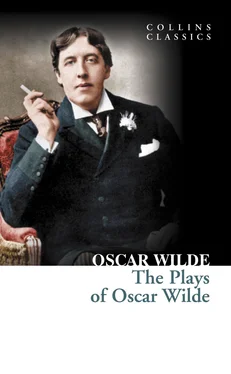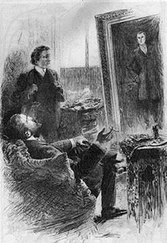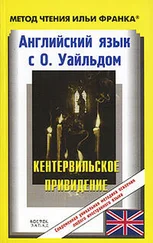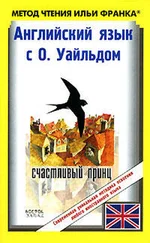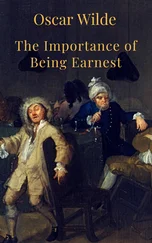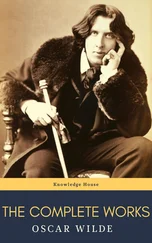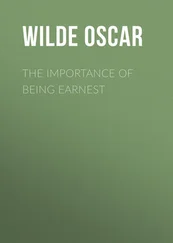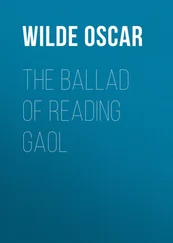LADY HUNSTANTON: I assure you, dear, that the country has not that effect at all. Why, it was from Melthorpe, which is only two miles from here, that Lady Belton eloped with Lord Fethersdale. I remember the occurrence perfectly. Poor Lord Belton died three days afterwards of joy, or gout. I forget which. We had a large party staying here at the time, so we were all very much interested in the whole affair.
MRS. ALLONBY: I think to elope is cowardly. It’s running away from danger. And danger has become so rare in modern life.
LADY CAROLINE: As far as I can make out, the young women of the present day seem to make it the sole object of their lives to be always playing with fire.
MRS. ALLONBY: The one advantage of playing with fire, Lady Caroline, is that one never gets even singed. It is the people who don’t know how to play with it who get burned up.
LADY STUTFIELD: Yes; I see that. It is very, very helpful.
LADY HUNSTANTON: I don’t know how the world would get on with such a theory as that, dear Mrs. Allonby.
LADY STUTFIELD: Ah! The world was made for men and not for women.
MRS. ALLONBY: Oh, don’t say that, Lady Stutfield. We have a much better time than they have. There are far more things forbidden to us than are forbidden to them.
LADY STUTFIELD: Yes; that is quite, quite true. I had not thought of that.
Enter SIR JOHN and MR. KELVIL.
LADY HUNSTANTON: Well, Mr. Kelvil, have you got through your work?
KELVIL: I have finished my writing for the day, Lady Hunstanton. It has been an arduous task. The demands on the time of a public man are very heavy nowadays, very heavy indeed. And I don’t think they meet with adequate recognition.
LADY CAROLINE: John, have you got your overshoes on?
SIR JOHN: Yes, my love.
LADY CAROLINE: I think you had better come over here, John. It is more sheltered.
SIR JOHN: I am quite comfortable, Caroline.
LADY CAROLINE: I think not, John. You had better sit beside me.
SIR JOHN rises and goes across .
LADY STUTFIELD: And what have you been writing about this morning, Mr. Kelvil?
KELVIL: On the usual subject, Lady Stutfield. On Purity.
LADY STUTFIELD: That must be such a very, very interesting thing to write about.
KELVIL: It is the one subject of really national importance, nowadays, Lady Stutfield. I purpose addressing my constituents on the question before Parliament meets. I find that the poorer classes of this country display a marked desire for a higher ethical standard.
LADY STUTFIELD: How quite, quite nice of them.
LADY CAROLINE: Are you in favour of women taking part in politics, Mr. Kettle?
SIR JOHN: Kelvil, my love, Kelvil.
KELVIL: The growing influence of women is the one reassuring thing in our political life, Lady Caroline. Women are always on the side of morality, public and private.
LADY STUTFIELD: It is so very, very gratifying to hear you say that.
LADY HUNSTANTON: Ah, yes! The moral qualities in women – that is the important thing. I am afraid, Caroline, that dear Lord Illingworth doesn’t value the moral qualities in women as much as he should.
Enter LORD ILLINGWORTH.
LADY STUTFIELD: The world says that Lord Illingworth is very, very wicked.
LORD ILLINGWORTH: But what world says that, Lady Stutfield? It must be the next world. This world and I are on excellent terms. ( Sits down beside MRS. ALLONBY.)
LADY STUTFIELD: Every one I know says you are very, very wicked.
LORD ILLINGWORTH: It is perfectly monstrous the way people go about, nowadays, saying things against one behind one’s back that are absolutely and entirely true.
LADY HUNSTANTON: Dear Lord Illingworth is quite hopeless, Lady Stutfield. I have given up trying to reform him. It would take a Public Company with a Board of Directors and a paid Secretary to do that. But you have the secretary already, Lord Illingworth, haven’t you? Gerald Arbuthnot has told us of his good fortune; it is really most kind of you.
LORD ILLINGWORTH: Oh, don’t say that, Lady Hunstanton. Kind is a dreadful word. I took a great fancy to young Arbuthnot the moment I met him, and he’ll be of considerable use to me in something I am foolish enough to think of doing.
LADY HUNSTANTON: He is an admirable young man. And his mother is one of my dearest friends. He has just gone for a walk with our pretty American. She is very pretty, is she not?
LADY CAROLINE: Far too pretty. These American girls carry off all the good matches. Why can’t they stay in their own country? They are always telling us it is the Paradise of women.
LORD ILLINGWORTH: It is, Lady Caroline. That is why, like Eve, they are so extremely anxious to get out of it.
LADY CAROLINE: Who are Miss Worsley’s parents?
LORD ILLINGWORTH: American women are wonderfully clever in concealing their parents.
LADY HUNSTANTON: My dear Lord Illingworth, what do you mean? Miss Worsley, Caroline, is an orphan. Her father was a very wealthy millionaire or philanthropist, or both, I believe, who entertained my son quite hospitably, when he visited Boston. I don’t know how he made his money, originally.
KELVIL: I fancy in American dry goods.
LADY HUNSTANTON: What are American dry goods?
LORD ILLINGWORTH: American novels.
LADY HUNSTANTON: How very singular! … Well, from whatever source her large fortune came, I have a great esteem for Miss Worsley. She dresses exceedingly well. All Americans do dress well. They get their clothes in Paris.
MRS. ALLONBY: They say, Lady Hunstanton, that when good Americans die they go to Paris.
LADY HUNSTANTON: Indeed? And when bad Americans die, where do they go to?
LORD ILLINGWORTH: Oh, they go to America.
KELVIL: I am afraid you don’t appreciate America, Lord Illingworth. It is a very remarkable country, especially considering its youth.
LORD ILLINGWORTH: The youth of America is their oldest tradition. It has been going on now for three hundred years. To hear them talk one would imagine they were in their first childhood. As far as civilisation goes they are in their second.
KELVIL: There is undoubtedly a great deal of corruption in American politics. I suppose you allude to that?
LORD ILLINGWORTH: I wonder.
LADY HUNSTANTON: Politics are in a sad way, everywhere, I am told. They certainly are in England. Dear Mr. Cardew is ruining the country. I wonder Mrs. Cardew allows him. I am sure, Lord Illingworth, you don’t think that uneducated people should be allowed to have votes?
LORD ILLINGWORTH: I think they are the only people who should.
KELVIL: Do you take no side then in modern politics, Lord Illingworth?
LORD ILLINGWORTH: One should never take sides in anything, Mr. Kelvil. Taking sides is the beginning of sincerity, and earnestness follows shortly afterwards, and the human being becomes a bore. However, the House of Commons really does very little harm. You can’t make people good by Act of Parliament – that is something.
KELVIL: You cannot deny that the House of Commons has always shown great sympathy with the sufferings of the poor.
LORD ILLINGWORTH: That is its special vice. That is the special vice of the age. One should sympathise with the joy, the beauty, the colour of life. The less said about life’s sores the better, Mr. Kelvil.
KELVIL: Still our East End is a very important problem.
LORD ILLINGWORTH: Quite so. It is the problem of slavery. And we are trying to solve it by amusing the slaves.
LADY HUNSTANTON: Certainly, a great deal may be done by means of cheap entertainments, as you say, Lord Illingworth. Dear Dr. Daubeny, our rector here, provides, with the assistance of his curates, really admirable recreations for the poor during the winter. And much good may be done by means of a magic lantern, or a missionary, or some popular amusement of that kind.
Читать дальше
